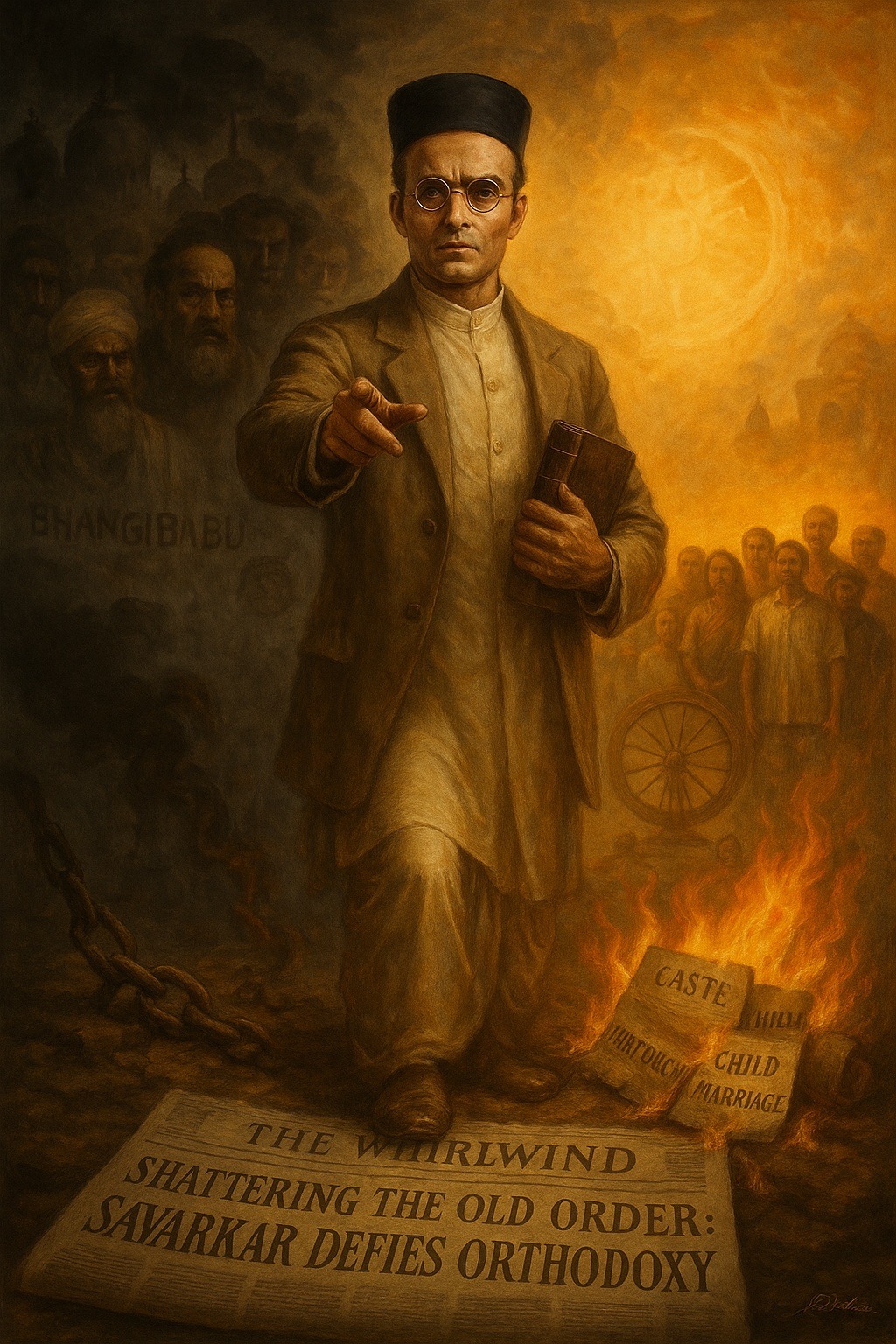Vinayak Damodar (Veer) Savarkar, a revolutionary thinker and social reformer, played a crucial role in challenging the rigid traditions of Hindu society. During his time in Ratnagiri, he maintained close contact with people from all sections of society and received widespread support—except from one particular group: the Hindu orthodox traditionalists. His relationship with them was especially contentious, as he posed a direct challenge to their long-standing dominance and social control.
Challenging Brahmin Supremacy and Caste Discrimination
Savarkar was not only a fierce opponent of the caste system but also an outspoken critic of the Brahminical hegemony that had long dictated social order. He saw the struggle for social reform as part of a broader fight against doctrinal supremacy, ethical exclusivity, and ultimately, the use of religious legitimacy to wield political power. At every opportunity, he questioned the assumed superiority of the Brahmins, holding them responsible for hindering Hindu society’s progress by perpetuating outdated beliefs and social restrictions.
The social ills of the time, deeply embedded in religious beliefs and superstitions, were largely maintained by the Hindu orthodoxy. Savarkar recognized the immense injustice these practices caused and made it his mission to expose and challenge them. This inevitably brought him into direct conflict with the dominant conservative factions of Hindu society, who strongly resisted his reformist ideas and actions.
The Backlash from Hindu Orthodoxy
Initially, Savarkar was respected among traditional Hindu circles. However, as he began actively advocating for social reform, he faced increasing hostility. Orthodox leaders and their followers, who viewed his reforms as a direct threat to their authority, resorted to personal attacks—mockingly calling him Bhangibabu (scavenger, ragpicker) in an attempt to discredit him.
To Savarkar, these traditionalists lacked both moral integrity and the ability to adapt to evolving social norms. They refused to accept criticism of regressive practices such as superstition, polygamy, child marriage, and caste-based discrimination, which they justified under the guise of religious doctrine. Many priests, driven by ignorance or material gain, upheld these practices, further entrenching social stagnation.
A Call for Reform and Rebellion
Savarkar saw the orthodox elite as responsible for the intellectual and moral decay of Hindu society. He accused them of imposing unnecessary restrictions that not only enslaved them but also kept millions of others trapped in ignorance and suffering. The lower and oppressed castes, in particular, had no means of escaping these harmful traditions, as they were deeply ingrained in the socio-religious structure of the time.
For Savarkar, the solution was clear—Hinduism needed to be freed from the chains of blind faith, rigid customs, and orthodox bigotry. He called for a bold and radical transformation, urging society to rise against reactionary forces and embrace a new socio-political order based on reason, justice, and progress. His efforts in Ratnagiri reflected this vision, as he persistently worked towards dismantling the barriers imposed by the orthodoxy and paving the way for an egalitarian society.
Final Thoughts
Savarkar’s relentless struggle against Hindu orthodoxy remains a defining aspect of his legacy. His battle was not just against a system of caste and hierarchy but against the very mindset that resisted change. By questioning established traditions and advocating for reform, he sought to lay the foundation for a society where social mobility and progress were not dictated by birth but by merit and individual potential.
In today’s world, where debates on caste, religion, and reform continue, Savarkar’s fight against orthodoxy serves as a powerful reminder of the need to challenge outdated traditions and work towards a more inclusive and progressive society.
💭 What do you think? How does Savarkar’s approach to social reform compare with that of other leaders like B.R. Ambedkar or Mahatma Gandhi? Do you think Savarkar’s fight against caste discrimination resonates with today’s debates on social justice? Why or why not? How do you interpret Savarkar’s willingness to confront Brahminical orthodoxy despite being born a Brahmin himself? In what ways can challenging religious orthodoxy lead to broader social and political reform? Which of Savarkar’s ideas on social reform do you personally find most relevant for building a more inclusive society today?
👉 Share your thoughts in the comments below!
Sources:
GODBOLE, Vasudev Shankar. 2004. Rationalism of Veer Savarkar. Itihas Patrika Prashan: Thane/Mumbai.
Keer, Dhananjay. 1988. Veer Savarkar. Third Edition. (Second Edition: 1966). Popular Prakashan: Bombay (Mumbai).
KELKAR, B. K. 1989. „Harbinger of Hindu Social Revolution“, in SWATANTRYAVEER SAVARKAR RASHTRIYA SMARAK. 1989. Smarak Inauguration. 28 May 1989. Festschrift. Swatantryaveer Savarkar Rashtriya Smarak: Bombay (Mumbai), 49-51.
PHADTARE, T. C. 1975. Social and Political Thought of Shri V.D. Savarkar. A Thesis submitted to the Marathwada University for the Degree of Doctor of Philosophy. Unpublished: Aurangabad.
SAMPATH, Vikram. 2019. Savarkar (Part 1). Echoes from a forgotten past. 1883-1924.Penguin Random House India: Gurgaon.
Vaidya, Prem. 1997. Memorable Documentary on Revolutionary Freedom Fighter Veer Savarkar. Veer Savarkar Prakashan: Mumbai.


Leave a Reply